Do you know how YOU are DOing?

We all know that doctor who worked constantly, took little time for himself or herself, always seemed to be doing “okay”, until you hear he or she had suffered a serious health concern, or worse yet, sudden death. Occurrences like this lead one to ask, “Could that have been prevented?”
Primary prevention. It is what we osteopathic physicians do well. Practicing evidenced-based medicine, identifying risk factors for leading causes of death and partnering with patients to reduce their relative risks for disease, and identify disease in the earliest treatable stages are the cornerstones of wellness. But when was the last time YOU saw your own physician? When was your last check-up? Do you know your blood sugar level, cholesterol level, BMI? How well is you blood pressure controlled? Are your immunizations and screenings up to date?
The leading cause of death for American physicians are the same top ten leading causes of death in the general population. According to the CDC, heart disease, cancer, chronic lower respiratory disease, accidents, stroke, Alzheimer’s disease, diabetes, influenza and pneumonia, kidney disease and suicide account for the majority of deaths. That list has not changed much in nearly seven decades (although tuberculosis was listed as number 7 in 1949). What has changed is our ability as medical professionals to identify risks and improve life expectancy (from 65 years for men and 70 years for women in 1949 to 76 years for men and 79 years for women in 2017).
Follow your own good medical advice; see your DOctor, Doctor! She’ll want to know how you are DOing!
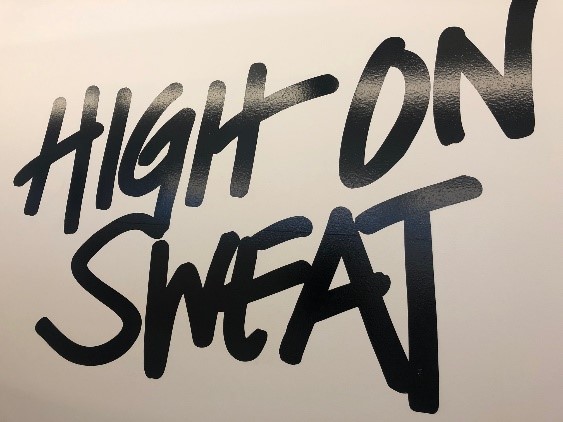 Postdoctoral training is rigorous and time-consuming. The emotional and physical implications of residency and fellowship call for trainees to take what little time they do have to participate in enjoyable activities that keep them going. As co-residents at Albert Einstein Medical Center in Philadelphia, we found the popular indoor cycling class, SoulCycle, to be our go-to wellness activity. Since our intern year, we have been arranging meet-ups at the music-blaring, sweat-dripping, lights-flashing dark room that is SoulCycle. Now, carrying on into our separate fellowships, we still find time to enjoy a 45-minute jam and cycle “sesh.”
Postdoctoral training is rigorous and time-consuming. The emotional and physical implications of residency and fellowship call for trainees to take what little time they do have to participate in enjoyable activities that keep them going. As co-residents at Albert Einstein Medical Center in Philadelphia, we found the popular indoor cycling class, SoulCycle, to be our go-to wellness activity. Since our intern year, we have been arranging meet-ups at the music-blaring, sweat-dripping, lights-flashing dark room that is SoulCycle. Now, carrying on into our separate fellowships, we still find time to enjoy a 45-minute jam and cycle “sesh.”
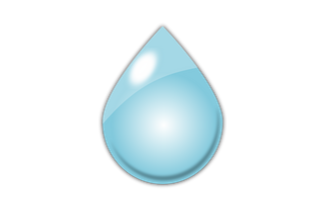 Throughout my 20-something year career in outpatient medicine, I’ve had the opportunity to enjoy a wonderful connection with many patients behind the closed doors of my offices. There, patients can freely smile, cry, and share concerns without a fear of judgement. This emotional sharing allows for a powerful connection between patient and physician. Sometimes I know more about their inner thoughts and fears than their family does. I’ve laughed with my patients as well as shed many a tear in solidarity with them. Both encounters are equally powerful to me as well as to me patients. Don’t be afraid to express your humanity in the moment.
Throughout my 20-something year career in outpatient medicine, I’ve had the opportunity to enjoy a wonderful connection with many patients behind the closed doors of my offices. There, patients can freely smile, cry, and share concerns without a fear of judgement. This emotional sharing allows for a powerful connection between patient and physician. Sometimes I know more about their inner thoughts and fears than their family does. I’ve laughed with my patients as well as shed many a tear in solidarity with them. Both encounters are equally powerful to me as well as to me patients. Don’t be afraid to express your humanity in the moment. “Art is the queen of all sciences communicating knowledge to all the generations of the world.”
“Art is the queen of all sciences communicating knowledge to all the generations of the world.” 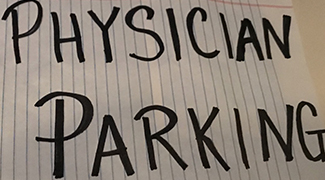

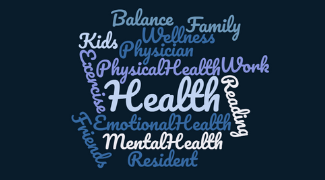 As residents, working 12 hours a day, we often wonder, “How do we do it all?”. It feels easy to be overwhelmed at the idea of achieving wellness. While we strive to have the perfect professional and personal life balance, it sometimes feels impossible to read, exercise, do household chores, and fulfill the role of a loving partner/parent/child/friend when we return back home.
As residents, working 12 hours a day, we often wonder, “How do we do it all?”. It feels easy to be overwhelmed at the idea of achieving wellness. While we strive to have the perfect professional and personal life balance, it sometimes feels impossible to read, exercise, do household chores, and fulfill the role of a loving partner/parent/child/friend when we return back home.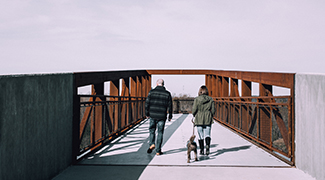 When I was first approached by a good friend to write this article for “how are you DOing”, I laughed. But I wasn’t asked to write a “How are you DOing” I was asked to write “Who DO you walk?”
When I was first approached by a good friend to write this article for “how are you DOing”, I laughed. But I wasn’t asked to write a “How are you DOing” I was asked to write “Who DO you walk?”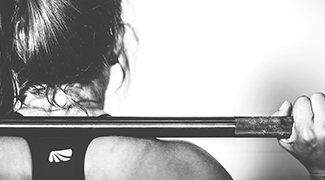 I knew residency wouldn’t be easy for someone as beholden to REM cycles as I am, though I naively believed I could make it through four years of training unaffected by their relative absence. It turns out that was wishful thinking. Although I took an oath to do no harm to my patients, learning how to practice medicine came at the cost of my own health and well-being.
I knew residency wouldn’t be easy for someone as beholden to REM cycles as I am, though I naively believed I could make it through four years of training unaffected by their relative absence. It turns out that was wishful thinking. Although I took an oath to do no harm to my patients, learning how to practice medicine came at the cost of my own health and well-being. Have you ever found yourself so overwhelmed you literally didn’t know where to start sorting through your “to-do” list? Been there, done that.
Have you ever found yourself so overwhelmed you literally didn’t know where to start sorting through your “to-do” list? Been there, done that.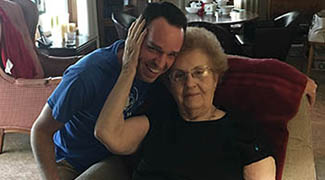 When we were young, my brother and I spent much of our summers at my grandma and grandpa’s farm in Boswell, Indiana. Running around with our cousins in the country and being doted on by grandparents was typically much more appealing than being cooped up in the suburbs and getting assigned the perfunctory summer chores from our mom.
When we were young, my brother and I spent much of our summers at my grandma and grandpa’s farm in Boswell, Indiana. Running around with our cousins in the country and being doted on by grandparents was typically much more appealing than being cooped up in the suburbs and getting assigned the perfunctory summer chores from our mom.
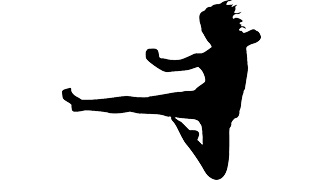 Jab! Cross! Left body hook! Right front kick! Left side kick! Right roundhouse kick! Beads of sweat drip down my face as I finish Round Six. I am exhausted. The sense of accomplishment is palpable. Not only have I made it through one hour of high intensity exercise after a long day of work in the office, but I have learned a few valuable life lessons along the way.
Jab! Cross! Left body hook! Right front kick! Left side kick! Right roundhouse kick! Beads of sweat drip down my face as I finish Round Six. I am exhausted. The sense of accomplishment is palpable. Not only have I made it through one hour of high intensity exercise after a long day of work in the office, but I have learned a few valuable life lessons along the way.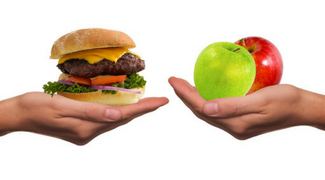 How are you DOing? Or, should I say, “How are you EATING?” During our medical training we spend hours learning about cardiac disease, pulmonary disease, blood disorders, diabetes and surgical emergencies, but relatively little about nutrition. Nutrition, unless properly balanced, has a negative impact on all organ systems!
How are you DOing? Or, should I say, “How are you EATING?” During our medical training we spend hours learning about cardiac disease, pulmonary disease, blood disorders, diabetes and surgical emergencies, but relatively little about nutrition. Nutrition, unless properly balanced, has a negative impact on all organ systems!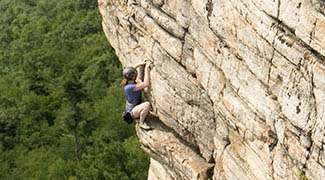 On my first day in the hospital as a new intern, I had the healthy amount of fear that most new DOs have. I anticipated that long hours and dedication to taking every opportunity to learn would leave very little time to spend with family, friends or for self-care. I thought I would be putting my personal life on pause during the next three years in order to focus on becoming the best clinician I could become. Starting a new hobby or interest didn’t even cross my mind. As a single person entering the rigorous life of residency, I also thought dating would be off the table for the foreseeable future.
On my first day in the hospital as a new intern, I had the healthy amount of fear that most new DOs have. I anticipated that long hours and dedication to taking every opportunity to learn would leave very little time to spend with family, friends or for self-care. I thought I would be putting my personal life on pause during the next three years in order to focus on becoming the best clinician I could become. Starting a new hobby or interest didn’t even cross my mind. As a single person entering the rigorous life of residency, I also thought dating would be off the table for the foreseeable future.
 We all know that doctor who worked constantly, took little time for himself or herself, always seemed to be doing “okay”, until you hear he or she had suffered a serious health concern, or worse yet, sudden death. Occurrences like this lead one to ask, “Could that have been prevented?”
We all know that doctor who worked constantly, took little time for himself or herself, always seemed to be doing “okay”, until you hear he or she had suffered a serious health concern, or worse yet, sudden death. Occurrences like this lead one to ask, “Could that have been prevented?”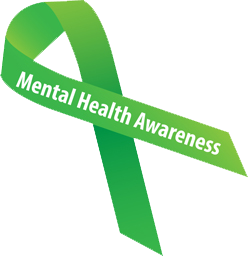 Depression is defined as persistent feelings of sadness and loss of interest in work or activities. In the medical profession, these feelings can be present in medical students, residents and practicing physicians. In a study recently conducted by the Council of Osteopathic Student Government Presidents (COSGP) and the Student Osteopathic Medical Association (SOMA), nearly 40 percent of medical student respondents admitted to feelings of depression and thoughts of suicide.
Depression is defined as persistent feelings of sadness and loss of interest in work or activities. In the medical profession, these feelings can be present in medical students, residents and practicing physicians. In a study recently conducted by the Council of Osteopathic Student Government Presidents (COSGP) and the Student Osteopathic Medical Association (SOMA), nearly 40 percent of medical student respondents admitted to feelings of depression and thoughts of suicide.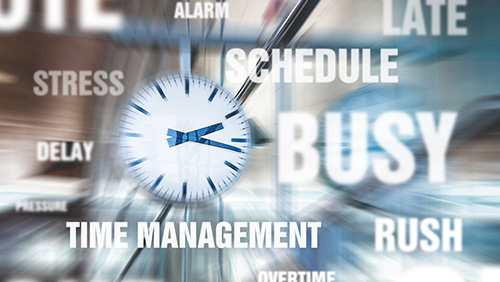 In our day-to-day lives as student physicians, residents, fellows and fully licensed practicing physicians, several things can add up to give us a less than pleasant day. Demanding patients, unexpected emergencies, backups in the waiting room, medication changes, pharmacy changes, and my favorite thing to dislike, the electronic health record, overwhelm us and add to our feelings of being stressed. Often we feel as if we are simply driftwood tossed randomly in a sea of regulations and compliance stipulations. Maybe not. How much do we actually add to the feeling of being stressed and under pressure?
In our day-to-day lives as student physicians, residents, fellows and fully licensed practicing physicians, several things can add up to give us a less than pleasant day. Demanding patients, unexpected emergencies, backups in the waiting room, medication changes, pharmacy changes, and my favorite thing to dislike, the electronic health record, overwhelm us and add to our feelings of being stressed. Often we feel as if we are simply driftwood tossed randomly in a sea of regulations and compliance stipulations. Maybe not. How much do we actually add to the feeling of being stressed and under pressure?